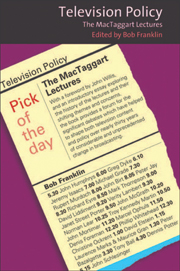Book contents
- Frontmatter
- Contents
- Acknowledgements
- Foreword
- Introduction
- The James MacTaggart Lectures
- TV Drama: The Case against Naturalism
- Naturalism and Television
- Taboos in Television
- Signposting Television in the 1980s: The Fourth Television Channel
- Television Drama, Censorship and the Truth
- The Day after Tomorrow: The Future of Electronic Publishing
- The Primacy of Programmes in the Future of Broadcasting
- Reflections on Working in Film and Television
- ‘Opening up the Fourth Front’: Micro Drama and the Rejection of Naturalism
- Power and Pluralism in Broadcasting
- Ethics, Broadcasting and Change: The French Experience
- Freedom in Broadcasting
- Deregulation and Quality Television
- The Future of Television: Market Forces and Social Values
- The Future of the BBC
- Occupying Powers
- A Culture of Dependency: Power, Politics and Broadcasters
- Talent versus Television
- A Glorious Future: Quality Broadcasting in the Digital Age
- Rewarding Creative Talent: The Struggle of the Independents
- Television versus the People
- Public-Interest Broadcasting: A New Approach
- A Time for Change
- The Soul of British Television
- Television's Creative Deficit
- Freedom of Choice: Public-Service Broadcasting and the BBC
- First Do No Harm
- Appendix A Edinburgh International Television Festival, 29 August–2 September 1977: Programme
- Appendix B Précis of Ted Turner, James MacTaggart Lecture 1982; Dr Jonathan Miller, James MacTaggart Lecture 1983
- Index
A Glorious Future: Quality Broadcasting in the Digital Age
from The James MacTaggart Lectures
Published online by Cambridge University Press: 05 August 2013
- Frontmatter
- Contents
- Acknowledgements
- Foreword
- Introduction
- The James MacTaggart Lectures
- TV Drama: The Case against Naturalism
- Naturalism and Television
- Taboos in Television
- Signposting Television in the 1980s: The Fourth Television Channel
- Television Drama, Censorship and the Truth
- The Day after Tomorrow: The Future of Electronic Publishing
- The Primacy of Programmes in the Future of Broadcasting
- Reflections on Working in Film and Television
- ‘Opening up the Fourth Front’: Micro Drama and the Rejection of Naturalism
- Power and Pluralism in Broadcasting
- Ethics, Broadcasting and Change: The French Experience
- Freedom in Broadcasting
- Deregulation and Quality Television
- The Future of Television: Market Forces and Social Values
- The Future of the BBC
- Occupying Powers
- A Culture of Dependency: Power, Politics and Broadcasters
- Talent versus Television
- A Glorious Future: Quality Broadcasting in the Digital Age
- Rewarding Creative Talent: The Struggle of the Independents
- Television versus the People
- Public-Interest Broadcasting: A New Approach
- A Time for Change
- The Soul of British Television
- Television's Creative Deficit
- Freedom of Choice: Public-Service Broadcasting and the BBC
- First Do No Harm
- Appendix A Edinburgh International Television Festival, 29 August–2 September 1977: Programme
- Appendix B Précis of Ted Turner, James MacTaggart Lecture 1982; Dr Jonathan Miller, James MacTaggart Lecture 1983
- Index
Summary
John Birt, then Director General of the BBC, used his 1996 MacTaggart Lecture to outline his vision for the BBC in the digital age. He began by listing the BBC's major achievements and concluded with a plea for an increase in the licence fee.
Reformulating Reith's original injunction that the BBC should ‘educate, inform and entertain’, Birt claimed in recent times the BBC's role has been to ‘delight, educate and inform’ and, by so doing, to act as ‘the touchstone of quality in UK broadcasting’. Birt summarises the BBC's considerable achievements: ‘we have become a major cultural patron … we have opened up intellectual vistas; and, at the same time … we have won the hearts of our viewers and listeners’.
While the digital age of broadcasting offers considerable advantages, there are a number of dangers confronting the BBC which must be overcome by government and regulators. First, the digital age will be dominated by the key players who own and control the vital gateway into the home (the ‘set-top box’) which carries not only television signals but potentially unlimited economic and financial exchanges. The struggle to control this gateway will constitute ‘one of the great business battles shaping the next [i.e. the twenty-first] century, to rival the nineteenth-century battle for the railroad’. Second, the ready access to a global system of programming will encourage a decline in programme standards and an Americanised world culture.
- Type
- Chapter
- Information
- Television PolicyThe MacTaggart Lectures, pp. 191 - 200Publisher: Edinburgh University PressPrint publication year: 2005



